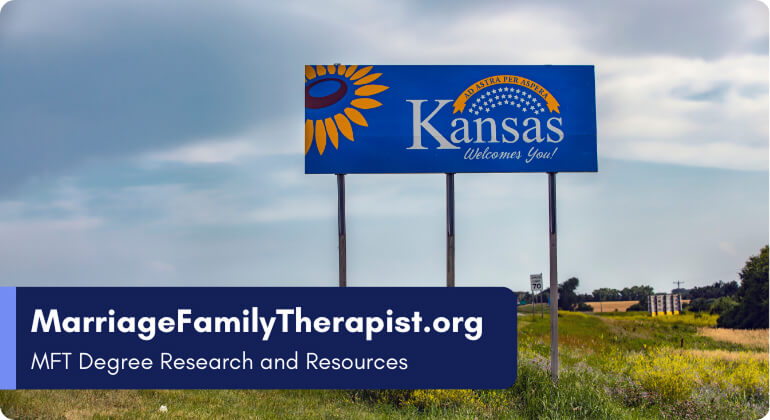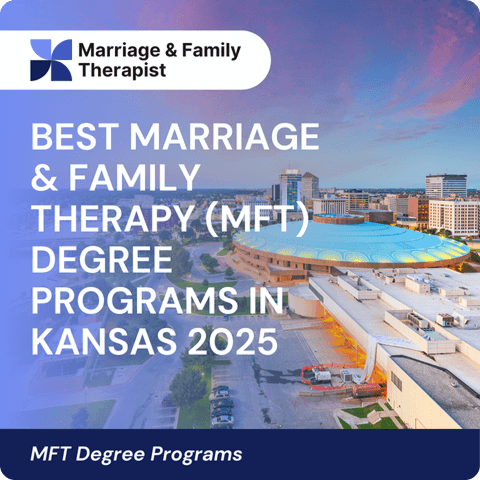Best Marriage & Family Therapy (MFT) Degree Programs in Kansas 2025
Pursuing a Marriage and Family Therapy (MFT) degree in Kansas prepares students for clinical work, licensure, and careers in private practice, community mental health, and hospital-based therapy. The state’s mental health workforce is growing, with an increasing demand for licensed therapists in both urban and rural areas.
Kansas offers COAMFTE-accredited and regionally approved programs that ensure students meet the state’s LMFT licensure requirements. These programs emphasize family systems therapy, trauma-informed counseling, and clinical practice, preparing graduates to work with individuals, couples, and families across a variety of settings.
Students in Kansas can choose between traditional in-person programs, hybrid models with a mix of online and on-campus coursework, and fully online options that allow for local clinical training placements. Many universities integrate practicum experiences into the curriculum, enabling students to develop hands-on skills while completing their education.
In this guide
2026 Best Marriage & Family Therapy (MFT) Programs in Kansas
Friends University
Wichita, KS - Private 4-year - friends.edu
Master's - Master of Science in Family Therapy
Online & Campus Based - Visit Website
Friends University's Master of Science in Family Therapy, a COAMFTE-accredited hybrid program, spans 24 months and 60 credits, focusing on interpersonal and sociocultural competencies. Students contribute over 10,000 clinical hours annually, leading to high job placement rates in counseling and therapy. Day and evening cohorts at Wichita and Kansas City campuses offer accessibility, with no entrance exam required. This military-friendly program emphasizes systemic therapy and experienced faculty, preparing graduates for licensure and diverse mental health careers.
- COAMFTE Accredited Program
- Two Campus Locations: Wichita/KC
- 24-month, 60-credit degree
- Day and evening cohorts
- High job placement rates
- Multiple application rounds
- Experienced, accessible faculty
- Systemic therapy approach
- Over 10,000 clinical hours
Graduate Certificate - Master of Science in Family Therapy
Online & Campus Based - Visit Website
Friends University's Master of Science in Family Therapy is a COAMFTE-accredited hybrid program requiring 60 credits over 16 months, with a supervised clinical internship. It prepares students for licensure in Kansas and Missouri through a curriculum emphasizing systemic thinking and cultural sensitivity, including 1,000 clinical training hours and 500 direct client contact hours. Evening and weekend courses at Wichita and Lenexa campuses support flexibility. No entrance exam is required, and the program is military-friendly, with a 3.0 GPA minimum for admission.
- 60 total credit hours
- 16-month supervised clinical internship
- COAMFTE accredited program
- Licensure-ready curriculum
- Two campus locations: Wichita and Lenexa
- 3.0 GPA minimum requirement
- 1,000 clinical training hours
- 500 direct client contact hours
- Evening and weekend course formats
- Comprehensive professional portfolio
MidAmerica Nazarene University
Olathe, KS - Private 4-year - mnu.edu
Graduate Certificate - Master of Arts in Marriage, Couple, and Family Counseling
Online & Campus Based - Visit Website
MidAmerica Nazarene University offers a CACREP-accredited Master of Arts in Marriage, Couple, and Family Counseling, blending on-site and online learning in a 60-credit hybrid format. This 33-month program prepares graduates for licensure in Kansas and Missouri, emphasizing flexible scheduling with day and evening options. Admission requires a minimum 3.0 GPA, professional references, and an interview, with no entrance exam specified. Rooted in the Church of the Nazarene, it supports diverse family counseling skills through a robust curriculum, competitive pricing, and scholarship opportunities, starting in Fall 2025.
- 60 credit hours total
- Completed in 33 months
- CACREP accredited program
- On-site and online options
- Meets Kansas/Missouri licensure
- Minimum 3.0 GPA required
- Professional references needed
- Fall 2025 start available
- Remote attendance possible
- Interviews part of admission
Ottawa University-Ottawa
Ottawa, KS - Private 4-year - ottawa.edu
Master's - Master of Arts in Counseling (Gerocounseling)
Online & Campus Based - Visit Website
Ottawa University-Ottawa offers a Master of Arts in Counseling with a specialized Gerocounseling concentration, delivered in a hybrid format. This program focuses on family systems and therapeutic techniques tailored for aging populations, preparing students for state licensure. It includes 900 hours of field placement, professional growth seminars, and supervised clinical experience. A comprehensive exam is required for completion, but no entrance exam is needed for admission. Rooted in American Baptist affiliation and military-friendly, it emphasizes ethical training and advanced psychodiagnostic skills for diverse mental health careers.
- Marriage and Family Therapy concentration
- Prepares for state licensure
- 900 hours field placement
- Professional growth seminars
- Multiple counseling specializations
- Clinical foundations courses
- Ethical and professional training
- Advanced psychodiagnostic planning
- Supervised counseling experience
- Comprehensive exam required
MFT Programs in Kansas
Kansas offers several regionally accredited programs that align with state licensure requirements and provide students with hands-on clinical training.
These programs focus on mental health assessment, ethical counseling practices, and evidence-based therapeutic approaches, ensuring that students gain the practical experience necessary to succeed as LMFTs. Many programs offer internships and practicum placements in mental health organizations, schools, hospitals, and telehealth services, preparing graduates for real-world therapy practice.
Graduates from these programs can pursue careers in private practice, public mental health organizations, and specialized counseling centers, serving clients with various psychological and relational concerns.
Kansas’s Quickest MFT Programs
- Accelerated MFT degrees: Some programs offer intensive coursework with summer and fast-track options, allowing students to complete their master’s degree in as little as two years.
- Integrated clinical experience: Some programs begin practicum training early in the curriculum, enabling students to accumulate required clinical hours faster.
- Hybrid and online flexibility: Distance learning options provide the ability to complete coursework online while gaining hands-on experience through local clinical placements.
- Transfer credit eligibility: Students with prior coursework in psychology or counseling may be able to apply credits toward elective or foundational MFT courses, reducing total time to graduation.
For students seeking the fastest route to LMFT licensure, selecting structured programs that incorporate supervised training early in the program is key to expediting degree completion.
Kansas’s Cheapest MFT Programs
- Public universities offer lower tuition rates: In-state students benefit from reduced tuition costs at Kansas’ public institutions, making them a cost-effective choice.
- Financial aid and graduate assistantships: Many MFT programs provide scholarships and work-study opportunities to help students offset tuition costs.
- Hybrid and online programs reduce expenses: Some universities offer hybrid options, allowing students to work while studying, reducing financial strain.
- Loan forgiveness for LMFTs in rural areas: Kansas offers loan repayment programs for therapists who commit to working in underserved communities, helping students manage student debt after graduation.
By exploring financial aid, public university tuition benefits, and part-time study options, students in Kansas can obtain a high-quality MFT education while keeping costs manageable.
How to Become Licensed as an LMFT in Kansas
Step 1: Earn a Master’s or Doctorate in Marriage and Family Therapy
To qualify for LMFT licensure in Kansas, candidates must complete a COAMFTE-accredited or state-approved graduate program. The curriculum must include coursework in family therapy theories, psychological assessment, clinical ethics, and cultural competency. Most programs also require students to complete a supervised practicum, ensuring they gain real-world experience before graduation.
Step 2: Complete 3,000 Hours of Supervised Clinical Experience
Kansas requires LMFT candidates to accrue 3,000 hours of supervised experience, with at least 1,500 hours of direct client contact. These hours must be completed post-graduation under the supervision of a licensed LMFT, psychologist, or other qualified mental health professional.
Clinical hours provide valuable experience in diagnosing and treating relationship-based mental health issues, including couples therapy, family conflict resolution, and crisis intervention. Many LMFTs complete their hours by working in community mental health centers, private therapy practices, or school-based counseling programs.
Step 3: Pass the National MFT Examination
All candidates must pass the Association of Marital and Family Therapy Regulatory Boards (AMFTRB) National MFT Exam, which tests clinical reasoning, therapeutic interventions, and ethical decision-making. The exam ensures that LMFTs meet national professional standards before receiving their state license.
Step 4: Apply for Licensure Through the Kansas Behavioral Sciences Regulatory Board (BSRB).
Once education and clinical requirements are met, applicants must submit their official transcripts, proof of supervised hours, national exam scores, and a background check to the Kansas BSRB. The application process also includes a licensing fee and ethics training verification.
Step 5: Maintain Licensure Through Continuing Education
Licensed MFTs in Kansas must renew their license every two years by completing 30 continuing education (CE) credits, including:
- 3 hours in ethics training
- Specialized courses in trauma-informed care, telehealth, or addiction therapy
- Optional professional development workshops or online training programs
Maintaining CE requirements ensures that licensed therapists remain knowledgeable and up to date with best practices in the field.
LMFT Career & Salary Outlook in Kansas
- Average Salary: $57,600 per year
- Top 10% Salary: $85,000+ per year
- Entry-Level Salary: $45,000 per year
- High-Demand Areas: Wichita, Topeka, Kansas City, Overland Park
- Primary Work Environments: Private practice, community mental health agencies, hospitals, school-based therapy programs
Kansas has a strong job market for LMFTs, with many opportunities in urban and rural communities. The expansion of teletherapy and remote counseling services has further increased access to mental health care, allowing therapists to serve clients statewide without geographic limitations.
Kansas provides excellent opportunities for students pursuing a career in marriage and family therapy, offering structured educational pathways, affordable tuition options, and a strong job outlook. With a rising demand for LMFTs in both rural and urban settings, students who complete a COAMFTE-accredited program and gain supervised clinical experience will find diverse career options in mental health care.


Related Articles
- Support That Affirms: Navigating Mental Health as LGBTQ+
- The ROI of an MFT Degree: Analyzing the Financial Investment in Your Therapy Career
- From Student to Therapist: What to Expect in Your MFT Clinical Internship
- LMFT vs MFT: Is Licensure Necessary for Your Therapy Career?
- Who Will You Treat as a Marriage & Family Therapist? A Career Guide for Aspiring MFTs
- MFT Doctorate Degrees: DMFT vs PhD – Who Should Pursue Each Path?